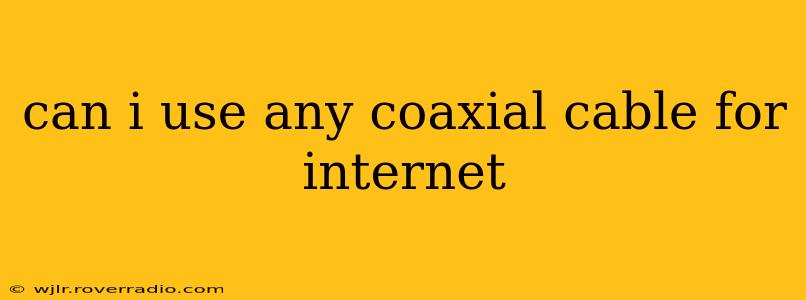Can I Use Any Coaxial Cable for Internet?
The short answer is: no, you can't use just any coaxial cable for internet. While all coaxial cables share a similar basic design—a central conductor surrounded by insulation, a braided shield, and an outer jacket—there are crucial differences that impact their suitability for internet service. Using the wrong cable can lead to poor signal quality, slow speeds, and even connection failures.
This guide will delve into the specifics, answering common questions and helping you understand what to look for when choosing a coaxial cable for your internet needs.
What Makes Coaxial Cables Different?
The key differences lie in the cable's impedance, shielding, and construction quality.
-
Impedance: This is arguably the most critical factor. Coaxial cables used for internet service, and cable television, are designed with a characteristic impedance of 75 ohms. Using a cable with a different impedance (e.g., 50 ohms, commonly used in some radio applications) will cause significant signal loss and degradation. This impedance mismatch leads to reflections of the signal, weakening the connection and reducing the data rate.
-
Shielding: The braided shield around the central conductor protects the signal from interference from external sources like electrical appliances and radio waves. Better shielding translates to a more stable and reliable connection, especially in areas with high electromagnetic interference. Different cables offer varying levels of shielding effectiveness. Look for cables with robust shielding for optimal performance.
-
Construction Quality: The quality of the materials used in the cable’s construction directly impacts its longevity and performance. Cheaper cables may use lower-quality materials, leading to signal degradation over time, increased signal loss, and a higher chance of cable failure.
What Happens if I Use the Wrong Coaxial Cable?
Using an unsuitable coaxial cable can result in several problems:
-
Slow Internet Speeds: A weak signal due to impedance mismatch or poor shielding will dramatically reduce your internet speed. You might experience frustrating lag, buffering issues, and inability to stream high-definition content.
-
Intermittent Connectivity: Interference from external sources can lead to frequent drops in your internet connection.
-
Signal Degradation: The signal weakens over distance, and a poor-quality cable exacerbates this issue, making it especially noticeable over longer runs.
-
No Connection at All: In some cases, using a completely incompatible cable might prevent your modem from establishing a connection to your internet service provider.
What Type of Coaxial Cable Should I Use for Internet?
For optimal internet performance, ensure you use a coaxial cable specifically designed for broadband internet or cable television applications. These cables will be labeled as such and will have a 75-ohm impedance. Look for cables made with quality materials and featuring solid shielding to minimize interference.
Can I Use a Cable TV Coaxial Cable for Internet?
Yes, in most cases, a coaxial cable designed for cable TV will work for internet, provided it's a 75-ohm cable and in good condition. However, it's important to note that the quality of the cable might impact the speed and stability of your internet connection, especially over longer distances.
How Long Can a Coaxial Cable Be Before Signal Degradation Becomes Significant?
The maximum length of a coaxial cable before signal degradation becomes noticeable depends on several factors, including cable quality, frequency, and the type of signal. However, as a general guideline, for broadband internet, excessive lengths (hundreds of feet) can begin to introduce noticeable signal loss. If you are dealing with long runs, consider using a cable amplifier to boost the signal strength.
How Can I Test the Quality of My Coaxial Cable?
While comprehensive testing requires specialized equipment, you can perform some basic checks:
- Visual Inspection: Look for any visible damage to the cable, such as cuts, kinks, or exposed wiring.
- Connection Stability: Observe your internet connection for stability. Frequent drops or slow speeds might indicate a problem with the coaxial cable.
- Signal Strength Check (if possible): Your modem or router may display signal strength information. Low signal strength suggests a cable issue.
By carefully considering the impedance, shielding, and overall quality of your coaxial cable, you can ensure a reliable and high-speed internet connection. Remember, investing in a high-quality cable is a small price to pay for avoiding potential connectivity problems and maximizing your internet experience.
